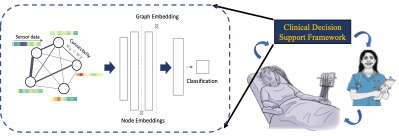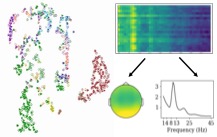Machine Intelligence for Neurologic Disease Diagnosis and Treatments

Computer Science & Engineering
Physician shortages are impacting healthcare delivery across the United States, particularly in rural settings. With continuing deficits predicted over the next several years, the problem can only worsen as populations age. However, the present-day clinical care relies extensively on visual interpretation of patient data, which is unfortunately relegated to expert clinicians. The burden of having to review large volumes of patient data not only contributes to the escalation of physician burnout, but also introduces reviewer bias and potential errors in diagnosis and clinical treatment decisions. In fact, several studies have reported that the inter-reviewer agreement in reviewing patient data and the reliability of visual review-based diagnoses are surprisingly poor. As such, there is a critical need to develop solutions that can, a) augment expert visual review of patient data, b) reduce the workload, and c) enhance the reliability, reproducibility, and scalability of clinical decisions.
The Health Intelligence Laboratory, led by Prof. Yoga Varatharajah, is focusing on developing machine learning (ML)-based solutions to address these needs, with a particular focus on neurological applications. The lab is also interested in extracting novel insights from clinical data that can improve the current standard of neurological care. Our lab works very closely with clinicians at the Mayo Clinic and the University of Minnesota Medical School to improve the clinical management of diseases such as epilepsy and Alzheimer’s disease. Our research has been generously supported by the National Science Foundation and the Mayo Clinic Foundation.

A project we are working on currently is on improving the reliability of scalp-EEG-based neurological disease diagnosis. Scalp EEG is a lengthy multichannel recording of brain electrical activity, which is a first line diagnostic test for epilepsy and sleep disorders. However, the review of these tests is currently performed by trained experts and their diagnostic potential is very limited. Working with electrophysiology expert Dr. Gregory Worrell at the Mayo Clinic, my student Ph.D. student Neeraj and I are investigating novel domain-guided ML approaches to capture the spatio-temporal dynamics of EEG data and learn representations that can distinguish a range of neurological conditions and their subtypes from scalp EEG tests even when experts classified those tests as normal studies. Our preliminary results show that we can successfully diagnose several subtypes of epilepsy and cognitive disorders from EEG tests that were classified as normal. Our current efforts are focused on improving the robustness of these ML models in the presence of distribution shifts during deployment. We are exploring novel methods to model distribution shifts and customized adversarial and generative ML approaches to generate data samples that can improve the generalizability of ML models in deployment settings.

In another project, we are exploring novel interpretable ML approaches to translate complex longitudinal data into meaningful low-dimensional representations that can assist with remote patient monitoring, tracking treatment outcomes, and treatment optimization. Specifically, we are developing a domain-guided self-supervision and tensor decomposition approaches that decompose time series data into meaningful patterns describing various physiological processes.

We then use these patterns to characterize individuals, their disease profiles, and how treatments alter these profiles. Working with researchers in the UMN Medical School, we are investigating how these approaches can be used to glean actionable insights from data collected from wearable and implanted devices and how we can develop control algorithms that can leverage those insights to optimize treatment parameters.
To learn more about our lab’s research, please visit our lab website: https://sites.google.com/view/yoga-personal/lab. We always welcome collaborators and student researchers in the space of healthcare and ML. If you are interested in working with us, feel free to reach out to one of the lab members.